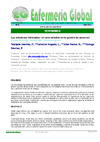Identificador persistente para citar o vincular este elemento:
https://accedacris.ulpgc.es/jspui/handle/10553/75857
| Campo DC | Valor | idioma |
|---|---|---|
| dc.contributor.author | Marqués Sánchez, María del Pilar | en_US |
| dc.contributor.author | Farrerons Noguera, L. | en_US |
| dc.contributor.author | Arias Ramos, Natalia | en_US |
| dc.contributor.author | Quiroga Sánchez, Enedina | en_US |
| dc.date.accessioned | 2020-11-24T08:30:55Z | - |
| dc.date.available | 2020-11-24T08:30:55Z | - |
| dc.date.issued | 2012 | en_US |
| dc.identifier.issn | 1695-6141 | en_US |
| dc.identifier.other | Scopus | - |
| dc.identifier.uri | https://accedacris.ulpgc.es/handle/10553/75857 | - |
| dc.description.abstract | Health organizations are considered by experts how one of the most complexity about management and resources of human. The reason is a lot of strenght emotions lived every day so much with patients so with peers. Lived experiences, where they are linked (combined), joy(felicity), sorrow and stress situations, can be the cause of wrong (bad) climate and so to impact (shaping) on the future performance of the health organizations. The objective of this paper is to argue the value of social relationship o informal relationship among workers and how those can knith (draw) a structure by the which, flow knowledge, creativity and values. Secondary to this, the organisationally culture is able to improve the performance of health enterprise. | en_US |
| dc.description.abstract | Las organizaciones sanitarias son consideradas por los expertos como una de las más complejas a nivel de gestión y política de personas. El hecho responde a la intensidad de las emociones vividas en el día a día tanto con el paciente como con los colegas. Las experiencias vividas donde se combinan alegrías, tristezas y momentos estresantes generan en muchas organizaciones sanitarias un clima laboral inadecuado que repercute negativamente en el rendimiento de las organizaciones de salud. Este artículo pretende justificar teóricamente, la importancia de las relaciones sociales o informales que se establecen entre los trabajadores y cómo éstos pueden tejer un entramado por el que fluyan conocimiento, creatividad y valores que provoquen una cultura organizativa capaz de aumentar el rendimiento de la empresa sanitaria. | en_US |
| dc.language | spa | en_US |
| dc.relation.ispartof | Enfermeria Global | en_US |
| dc.source | Enfermeria Global [EISSN 1695-6141], v. 11 (2), p. 310-323, (Abril 2012) | en_US |
| dc.subject | 3212 Salud pública | en_US |
| dc.subject.other | Health Organization | en_US |
| dc.subject.other | Performance | en_US |
| dc.subject.other | Social Capital | en_US |
| dc.subject.other | Social Networks | en_US |
| dc.subject.other | Values | en_US |
| dc.subject.other | Relaciones informales | en_US |
| dc.subject.other | Organizaciones sanitarias | en_US |
| dc.subject.other | Gestión enfermera | en_US |
| dc.subject.other | Capital social | en_US |
| dc.title | Las relaciones informales: Un valor añadido en la gestión de personas | en_US |
| dc.title.alternative | Informal relationships: An added value in human management | en_US |
| dc.type | info:eu-repo/semantics/Article | en_US |
| dc.type | Article | en_US |
| dc.identifier.scopus | 84861121721 | - |
| dc.contributor.authorscopusid | 55220164700 | - |
| dc.contributor.authorscopusid | 55220164100 | - |
| dc.contributor.authorscopusid | 55220163900 | - |
| dc.contributor.authorscopusid | 57194152124 | - |
| dc.identifier.eissn | 1695-6141 | - |
| dc.description.lastpage | 323 | en_US |
| dc.identifier.issue | 2 | - |
| dc.description.firstpage | 310 | en_US |
| dc.relation.volume | 11 | en_US |
| dc.investigacion | Ciencias de la Salud | en_US |
| dc.type2 | Artículo | en_US |
| dc.utils.revision | Sí | en_US |
| dc.date.coverdate | Abril 2012 | en_US |
| dc.identifier.ulpgc | Sí | en_US |
| item.grantfulltext | open | - |
| item.fulltext | Con texto completo | - |
| Colección: | Artículos | |
Citas SCOPUSTM
1
actualizado el 08-jun-2025
Visitas
39
actualizado el 10-ene-2026
Descargas
48
actualizado el 10-ene-2026
Google ScholarTM
Verifica
Comparte
Exporta metadatos
Los elementos en ULPGC accedaCRIS están protegidos por derechos de autor con todos los derechos reservados, a menos que se indique lo contrario.
